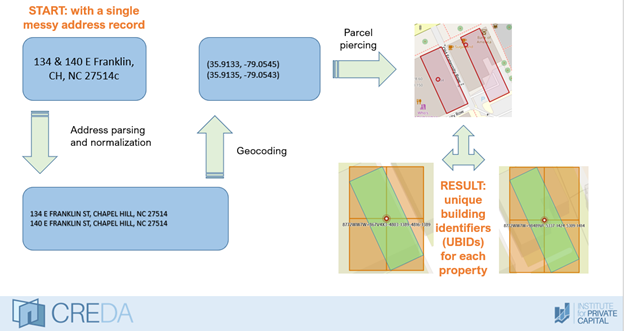CREDA

How to get involved with CREDA
I. What’s CREDA?
The Commercial Real Estate Data Alliance (CREDA) is a consortium of academics dedicated to achieving data parity with other major asset classes. Specifically, we believe that improved access to and understanding of available data in commercial real estate is key to fostering higher quality research and interactions between academia and industry, to the benefit of the entire CRE community.
CREDA is one of three research initiatives of the Institute for Private Capital. IPC is a multi-university initiative involving leading scholars in private capital, dedicated to improving the public understanding of the role of private capital in the global economy. IPC is affiliated with the Kenan Institute for Private Enterprise, at the University of North Carolina’s Kenan-Flagler Business School.
II. What’s the problem?
Data scarcity in private capital has long been an issue across all categories of private capital, which presents a major problem for academic researchers. In the field of commercial real estate, one of the main issues is the difficulty researchers face in matching existing datasets to other sets, especially as addresses are notoriously bad identifiers for trying to make matches across data sets.
Put another way: most existing datasets lack an ability to talk to each other.
III. What’s the solution?
CREDA is trying to help solve that problem by converting physical addresses to standardized geospatial shapes.
Perhaps the best way to understand CREDA’s process is shown in the image below. This image also highlights the role of the Department of Energy’s Unique Building Identifiers (UBIDs), which turn long and complicated shape file codes into something much easier to use.

As the image shows, this process turns property addresses into a geospatial identifier that carries so much more information than an address – and the geospatial identifier makes it a lot easier to match records within different datasets. After going through this process with a dataset, the researcher’s query becomes: “does this figure overlap with any others?” … which is both an easier and richer approach to discovering relationships across data records.
Put another way: imagine you have a list of a person’s names (e.g., James E. Smith, Jim Smith, J.E. Smith). Being able to match a photo of the person with the different versions of the name offers more information than a name alone.
IV. What is CREDA trying to accomplish?
CREDA has recently launched an open-source toolkit that makes this solution publicly available.
By developing open-source tools and documentation for batch correction and standardization of addresses, geocoding, and UBID assignments, we hope to support large-scale implementation of a process that facilitates CRE data merging … and puts us closer to our goal of achieving data parity with other major asset classes.
Because we want to continually improve the methodology of this process, and to assist CREDA sponsors and affiliates in implementation, we have posted these tools in the form of code on the GitHib open-source repository.
The initial release of CREDA_tools includes:
- Tools to enact the process outlined above – this will take addresses through standardization, geocoding, parcel piercing, and UBID assignment
- Nine scripts that can be followed as examples for users, with 10 accompanying sample input files
- Extensive documentation so end users can understand the goals and usage of the project
V. How can I get involved or find out more?
We invite anyone who is interested in putting these tools to work to visit CREDA’s GitHub homepage.
Whether you’re a researcher, a CRE investor or practitioner: these CREDA_tools will be useful for anyone who wants to merge various property datasets, or is looking for relationships between property records.
We also invite data providers to utilize CREDA_tools: datasets that are able to be merged with other sets become more valuable.
For more information on CREDA’s mission and affiliated researchers, please visit us here.
For questions on this project or to get in touch with the primary architect (Prof. Jacob Sagi) and code developer (David Fisher) of CREDA_tools, please email us: uncipc@kenan-flagler.unc.edu